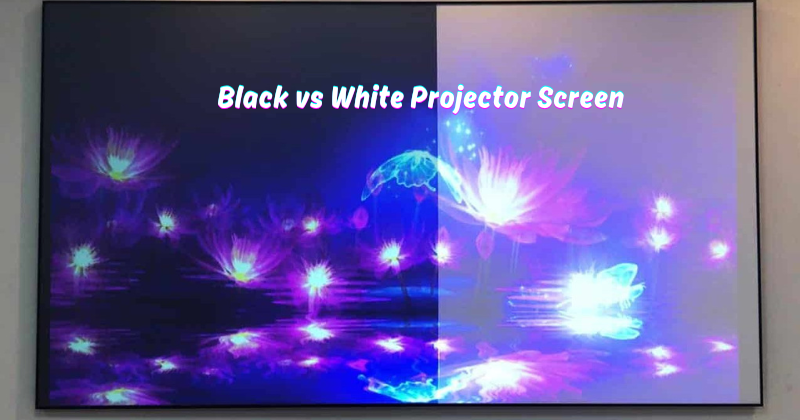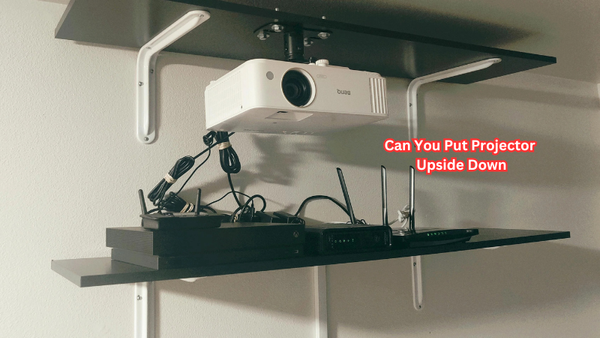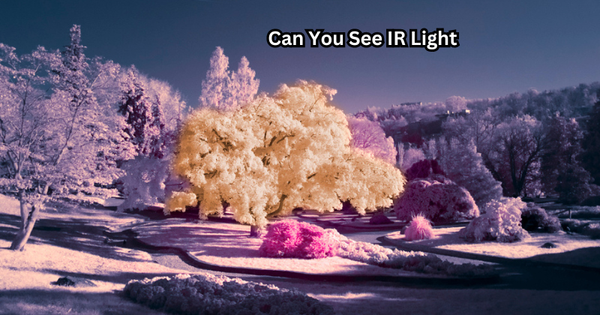Are you struggling to decide between a black or white projector screen? Look no further! In this article, we will explore both options' key differences and benefits. The color of your projector screen can greatly impact your viewing experience, so it's important to choose wisely.
A black projector screen offers enhanced contrast and deeper blacks, creating a more vivid and immersive image. This is especially beneficial when watching movies or playing games with dark scenes. On the other hand, a white projector screen provides a brighter and more vibrant image, ideal for well-lit environments or presentations.
Ultimately, choosing between a black or white projector screen depends on your specific needs and preferences. So, let's dive deeper into the pros and cons of each option to help you make an informed decision.
Short and Sweet Overview Black and White Projector Screens?
Black screens absorb ambient light and prevent it from reflecting onto the screen, resulting in better contrast and color saturation. This is achieved through a special coating or material that absorbs light instead of reflecting it. On the other hand, white screens reflect all incoming light, resulting in a brighter image overall. White screens controlled lighting conditions, making them ideal for presentations or brightly lit rooms.
Regarding viewing angles, black screens tend to have a narrower optimal range compared to white screens. This means viewers must be directly in front of the screen for the best image quality. White screens, on the other hand, have a wider optimal viewing angle, allowing viewers to sit at different angles and still have a good viewing experience.
How Black Projector Screens Work?
As mentioned, black projector screens absorb ambient light instead of reflecting it. This is achieved through a special coating or material that contains tiny ridges or bumps that trap light and prevent it from bouncing back onto the screen. By eliminating unwanted light, black screens enhance contrast and color saturation, resulting in a more immersive viewing experience. High-contrast screens can also reduce eye strain and improve overall image quality, making them popular for home theaters or gaming setups.
However, it's important to note that black projector screens are unsuitable for all situations. In a well-lit environment, black screens may appear dim and washed out due to their light-absorbing properties. Additionally, they may not be the best choice for presentations or brightly lit rooms where a brighter image is needed.
How White Projector Screens Work?
White projector screens reflect all incoming light, resulting in a brighter and more vibrant image. This is achieved through a special coating or material that contains reflective particles, such as aluminum flakes, which bounce light back onto the screen for improved brightness. White screens are also designed to evenly distribute light across the entire surface, resulting in a uniform image without hot spots or glare.
White projector screens are best suited for presentations, brightly lit rooms, and situations with a desired brighter image. They are also more versatile in viewing angles, allowing viewers to sit at different angles without sacrificing image quality. However, white screens may not provide the desired contrast ratio and deep blacks, making them less ideal for home theater use.
Black Projector Screen vs White Projector Screen: Which one is right for you?
Ultimately, deciding between a black or white projector screen depends on your specific needs and preferences. If you primarily use your projector for home theater purposes and want a more immersive viewing experience, a black screen may be the better option. On the other hand, if you frequently give presentations or have a brightly lit room, then a white screen may be the more practical choice.
Hybrid options, such as gray screens, offer a balance between the benefits of black and white screens. These can be a good compromise for those wanting enhanced contrast and brightness.
Black Projector Screen vs. White: What's the Difference?
The main difference between black and white projector screens is their light-reflecting properties. Let's dissect the comparison to facilitate an informed choice between black and white projector screens.
Contrast and Color Reproduction:
Black Screen:
Black screens offer superior contrast and color reproduction due to their light-absorbing properties. This results in deeper blacks, improved color saturation, and a more immersive viewing experience.
White Screen:
On the other hand, white screens reflect all incoming light, resulting in a brighter image overall but with less contrast than black screens. This can be beneficial for well-lit environments or presentations.
Viewing Angle:
Black Screen:
Black screens have a narrower optimal viewing angle, meaning viewers must be directly in front of the screen for the best image quality. Projected image can appear washed out or distorted if viewed from an angle.
White Screen:
White screens have a wider optimal viewing angle, allowing viewers to sit at different angles and still have a good viewing experience. This makes them more versatile in terms of placement and seating arrangements.
Ambient Light Handling:
Black Screen:
Black screens are designed to absorb ambient light and prevent it from reflecting back onto the screen, making them less suitable for well-lit environments. Reflect light can potentially diminish the image quality and make the projected image appear dim or washed out.
White Screen:
White screens reflect all incoming light, making them better suited for presentations or brightly lit rooms. However, in a dark room, they may appear too bright and wash out the image.
Maintenance:
Black Screen:
Since black screens are designed to absorb light, they may require more frequent cleaning to maintain their performance.
White Screen:
White screens are easier to clean and maintain due to their smooth surface, which allows for quick wiping.
Budget and Affordability:
Black Screen:
Black screens tend to be more expensive due to their specialized coating or material.
White Screen:
White screens are more affordable and widely available in various price ranges. Hybrid options such as gray screens may also offer a balance between the benefits of black and white screens at a lower cost.
These are some of the main differences between black and white projector screens. Ultimately, the best choice for you will depend on your specific needs and preferences. Whichever option you choose, a high-quality screen can greatly enhance your viewing experience with a projector. So, it's important to research and consider all factors before making a decision.
Is a Projector on a Black Wall Better?
A common question among projector users is whether a black wall can serve as a substitute for a black projector screen. While it may seem like a cost-effective and convenient solution, the answer is not that straightforward.
On one hand, painting your wall black can help absorb ambient light and improve contrast. However, this will likely result in an uneven surface that can cause hot spots or distort the image. Additionally, any imperfections on the wall may also affect the image quality.
On the other hand, using a white projector screen provides a smooth and even surface for better image reproduction. It also offers better light reflection and distribution, resulting in an overall brighter and more vibrant image. Gray screen options may also provide a balance between improved contrast and brightness.
Pros and Cons of Black and White Projector Screens
We will discuss some of the advantages and disadvantages of black and white projector screens to help you make an informed decision.
Black Projector Screen
Pros:
- The superior contrast and color reproduction
- More immersive viewing experience
- It can help absorb ambient light
Cons:
- Narrower optimal viewing angle
- It may require more maintenance and cleaning
- Higher cost compared to white screens
White Projector Screen
Pros:
- Brighter image overall
- Wider optimal viewing angle
- More versatile for different lighting environments
Cons:
- Less contrast and color saturation compared to black screens
- It may be too bright in a dark room
- It can show imperfections on the surface
FAQs
Is a white screen or a black screen better?
It depends on your specific needs and preferences. Black screens offer superior contrast and color reproduction, while white screens are more versatile in terms of viewing angle and better suited for well-lit environments.
Do I need a white screen for a projector?
It is not necessary to have a white screen for a projector, but it can greatly enhance your viewing experience. If you frequently give presentations or have a brightly lit room, then a white screen may be the more practical choice.
Is black or white screen good for eyes?
Both black and white screens can be good for the eyes, as long as the screen is of high quality and properly adjusted. However, in a dark room, a white screen may appear too bright and strain the eyes.
What are the benefits of black and white screen?
Black screens offer improved contrast and color reproduction, while white screens are more versatile and suitable for well-lit environments. Hybrid options such as gray screens may balance the benefits of black and white screens. Ultimately, it depends on your specific needs and preferences.
Conclusion
In conclusion, choosing between a black or white projector screen depends on your needs, preferences, and viewing environment. Both options have their unique advantages and considerations. If you prioritize contrast and immersive experiences, a black projector screen is the way to go. It enhances dark scenes, providing deeper blacks and richer colors, making it perfect for movie nights or gaming sessions.
On the other hand, if brightness and clarity are key factors for you, a white projector screen is a great choice. It delivers vibrant and well-defined images, making it suitable for well-lit environments or professional presentations where visibility is crucial. When deciding, consider factors such as ambient lighting, room lighting setup, and personal preferences. Consulting with experts or testing out different screens can also help you determine which option works best for your specific requirements.
Whether you choose black or white, investing in a high-quality projector screen will enhance your viewing experience and bring entertainment to a whole new level.





